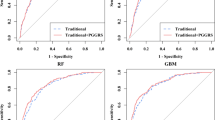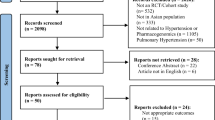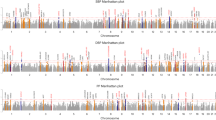Abstract
Renin–angiotensin (RAS) genes, a group of promising candidate genes involved in essential hypertension (EH), play a key role in blood pressure regulation. Recently, a series of novel RAS gene polymorphisms were reported, which significantly influence the rate of the gene transcription. This study was designed to explore the association between the RAS gene polymorphisms and EH in a remote countryside population. We examined six polymorphisms in the main component genes of RAS: angiotensin-converting enzyme (ACE) (I/D), angiotensinogen (AGT) (A-6G, A-20C, G-217A and T174 M) and angiotensin type 1 receptor (AT1R) (A1166C). Six polymorphisms were genotyped by gene chip technology. Association studies were performed in 220 EH patients and 235 normotensives. Our results revealed that AGT A-6G, T174 M and ACE-I/D were significantly associated with EH (AGT A-6G: AG+GG vs AA; OR=1.36; 95% CI=1.04–1.77. T174M: CT+TT vs CC; OR=1.45; 95% CI=1.15–1.90. ACE I/D: ID+DD vs II; OR=1.171; 95% CI=1.00–1.37). Moreover the logistic regression analysis suggested that the haplotype of AGT −6A, 174C, −217G and −20A might decrease the risk of EH (OR=0.64; 95% CI=0.49–0.83), after adjusting the confounding factors of gender, age and BMI. In conclusion, the AGT A-6G, T174 M and ACE I/D polymorphisms are associated with EH and the AGT haplotype −6A, 174C, −217G and −20A decrease the risk of EH in the southern Chinese population.
This is a preview of subscription content, access via your institution
Access options
Subscribe to this journal
Receive 12 digital issues and online access to articles
118,99 € per year
only 9,92 € per issue
Buy this article
- Purchase on SpringerLink
- Instant access to full article PDF
Prices may be subject to local taxes which are calculated during checkout

Similar content being viewed by others
References
Lufit FC . Geneticism of essential hypertension. Hypertension 2004; 43: 1155–1159.
Jeunemaitre X, Soubrier F, Kotelevtsev YV, Lifton RP, Williams CS, Charru A et al. Molecular basis of human hypertension: role of angiotensinogen. Cell 1992; 71: 169–180.
Xavier J . Renin-angiotensin-aldosterone system polymorphisms and essential hypertension: where are we? J Hypertens 2003; 22: 2219–2222.
Barbalic M, Skaric-Juric T, Cambien F, Barbaux S, Poirier O, Turek S et al. Gene polymorphisms of the renin-angiotensin system and early development of hypertension. Am J Hypertens 2006; 19: 837–842.
Velez DR, Guruju M, Vinukonda G, Prater A, Kumar A, Williams SM . Angiotensinogen promoter sequence variants in essential hypertension. Am J Hypertens 2006; 19: 1278–1285.
Province MA, Boerwinkle E, Chakravarti A, Cooper R, Fornage M, Leppert M et al. Lack of association of the angiotensinogen-6 polymorphism with blood pressure level in the comprehensive NHLBI family blood pressure program. Hypertension 2000; 18: 867–876.
Sugimoto K, Kat suya T, Ohkubo T, Hozawa A, Yamamoto K, Matsuo A et al. Association between angiotensin II type 1 receptor gene polymorphism and essential hypertension: the Ohasama Study. Hypertens Res 2004; 27: 551–556.
Bae Y, Park C, Han J, Hong YJ, Song HH, Shin ES et al. Interaction between GNB3 C825 T and ACE I/D polymorphisms in essential hypertension in Koreans. J Hum Hypertens 2007; 21: 159–166.
Jain S, Tang X, Narayanan CS, Agarwal Y, Peterson SM, Brown CD et al. Angiotensinogen gene polymorphism at -217 affects basal promoter activity and is associated with hypertension in African-Americans. Biol Chem 2002; 277: 36889–36896.
Dickson ME, Zimmerman MB, Rahmouni K, Sigmund CD . The -20 and -217 promoter variants dominate differential angiotensinogen haplotype regulation in angiotensinogen-expressing cells. Hypertension 2007; 49: 631–639.
Farahani P, Dolovich L, Levine M . Exploring design-related bias in clinical studies on receptor genetic polymorphism of hypertension. J Clin Epidemiol 2007; 60: 1–7.
Jiang X, Sheng HH, Lin G, Li J, Lu XZ, Cheng YL et al. Effect of renin-angiotensin-aldosterone system gene polymorphisms on blood pressure response to antihypertensive treatment. Chin Med J 2007; 120: 782–786.
Wu SJ, Chiang FT, Jiang JR, Hsu KL, Chern TH, Tseng YZ et al. The G-217A variant of the angiotensinogen gene affects basal transcription and is associated with hypertension in a Taiwanese population. Hypertension 2003; 21: 2061–2067.
Brand-Herrmann SM, Kopke K, Reichenberger F, Schmidt-Petersen K, Reineke T, Paul M et al. Angiotensinogon promoter haplotypes are associated with blood pressure in untreated hypertensives. Hypertension 2004; 22: 1289–1297.
Iso H, Harada S, Shimamoto T, Sato S, Kitamura A, Sankai T et al. Angiotensinogen T174 M and M235 T variants, sodium intake and hypertension among non-drinking, lean Japanese men and women. Hypertension 2000; 18: 1197–1206.
Wu XD, Luke A, Rieder M, Lee K, Toth EJ, Nickerson D et al. An association study of angiotensinogen polymorphismswith serum level and hypertension in an African-American population. J Hypertens 2003; 21: 1847–1852.
Yanai K, Nibu Y, Murakami K, Fukamizu A . Acis-acting DNA element located between TATA box and transcription initiation site is critical in response to regulatory sequences in human angiotensinogen gene. J Biol Chem 1996; 271: 15981–15986.
Ishtgami T, Umeura S, Tamura K, Hibi K, Nyui N, Kihara M et al. Essential Hypertension and 5′Upstream Core Promoter Region of Human Angiotensinogen Gene. Hypertension 1997; 30: 1325–1330.
Yanai K, Saito T, Hirota K, Kobayashi H, Murakami K, Fukamizu A . Molecular variation of the human angiotensinogen core promoter element located between the TATA box and transcription initiation site affects its transcriptional activity. J Biol Chem 1997; 272: 30558–30562.
Hunt SC, Cook NR, Oberman A, Cutler JA, Hennekens CH, Allender PS et al. Angiotensinogen genotype, sodium reduction, weigh tloss, and prevention of hypertension: trials of hypertension prevention, phase II. Hypertension 1998; 32: 393–401.
Rigat B, Hubert C, Alhenc-Gelas F, Cambien F, Corvol P, Soubrier F . An intion/deletion polymorphism in the angiotensin 1-converting enzyme gene accounting for half the variance of serum enzyme levels. J Clin Invest 1990; 86: 1343–1346.
O'Donnell CJ, Lindpaintner K, Larson MG, Rao VS, Ordovas JM, Schaefer EJ et al. Evidence for association and genetic linkage of the angiotensin-converting enzyme locus with hypertension and blood pressure in men but not women in the Framingham Heart Study. Circulation 1998; 97: 1766–1772.
Schork NJ . Genetically complex cardiovascular traits. Origins, problems, and potential solutions. Hypertension 1997; 29: 145–149.
Author information
Authors and Affiliations
Corresponding authors
Rights and permissions
About this article
Cite this article
Jiang, X., Sheng, H., Li, J. et al. Association between renin–angiotensin system gene polymorphism and essential hypertension: a community-based study. J Hum Hypertens 23, 176–181 (2009). https://doi.org/10.1038/jhh.2008.123
Received:
Revised:
Accepted:
Published:
Issue Date:
DOI: https://doi.org/10.1038/jhh.2008.123
Keywords
This article is cited by
-
Analysis of the Pattern, Alliance and Risk of rs1799752 (ACE I/D Polymorphism) with Essential Hypertension
Indian Journal of Clinical Biochemistry (2022)
-
The association between angiotensin II type 1 receptor A1166C gene polymorphism and the risk of essential hypertension: a meta-analysis
Egyptian Journal of Medical Human Genetics (2019)
-
Analysis of Association of Angiotensin II Type 1 Receptor Gene A1166C Gene Polymorphism with Essential Hypertension
Indian Journal of Clinical Biochemistry (2018)
-
Angiotensin-converting enzyme insertion/deletion polymorphism, 24-h blood pressure profile and left ventricular hypertrophy in hypertensive individuals: a cross-sectional study
European Journal of Medical Research (2015)
-
Identification of RAS genotypes that modulate blood pressure change by outdoor temperature
Hypertension Research (2013)



